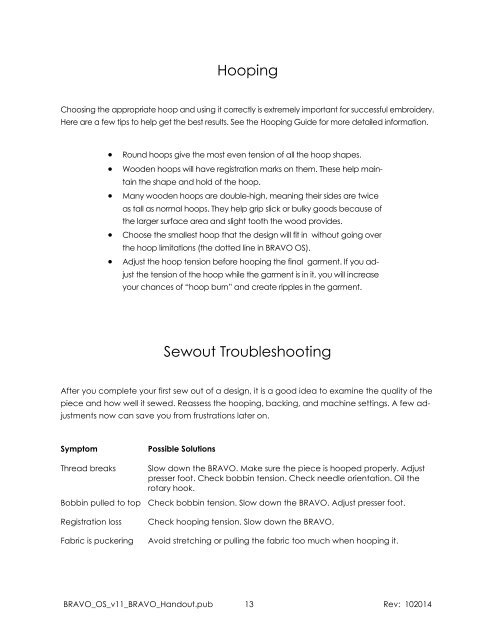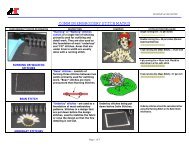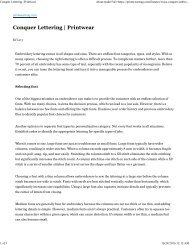Melco Compilation
You also want an ePaper? Increase the reach of your titles
YUMPU automatically turns print PDFs into web optimized ePapers that Google loves.
Hooping<br />
<br />
<br />
<br />
<br />
<br />
Round hoops give the most even tension of all the hoop shapes.<br />
Wooden hoops will have registration marks on them. These help maintain<br />
the shape and hold of the hoop.<br />
Many wooden hoops are double-high, meaning their sides are twice<br />
as tall as normal hoops. They help grip slick or bulky goods because of<br />
the larger surface area and slight tooth the wood provides.<br />
Choose the smallest hoop that the design will fit in without going over<br />
the hoop limitations (the dotted line in BRAVO OS).<br />
Adjust the hoop tension before hooping the final garment. If you adjust<br />
the tension of the hoop while the garment is in it, you will increase<br />
your chances of “hoop burn” and create ripples in the garment.<br />
Sewout Troubleshooting<br />
After you complete your first sew out of a design, it is a good idea to examine the quality of the<br />
piece and how well it sewed. Reassess the hooping, backing, and machine settings. A few adjustments<br />
now can save you from frustrations later on.<br />
Symptom<br />
Thread breaks<br />
Possible Solutions<br />
Slow down the BRAVO. Make sure the piece is hooped properly. Adjust<br />
presser foot. Check bobbin tension. Check needle orientation. Oil the<br />
rotary hook.<br />
Bobbin pulled to top Check bobbin tension. Slow down the BRAVO. Adjust presser foot.<br />
Registration loss<br />
Fabric is puckering<br />
Check hooping tension. Slow down the BRAVO.<br />
Avoid stretching or pulling the fabric too much when hooping it.<br />
BRAVO_OS_v11_BRAVO_Handout.pub 13 Rev: 102014




